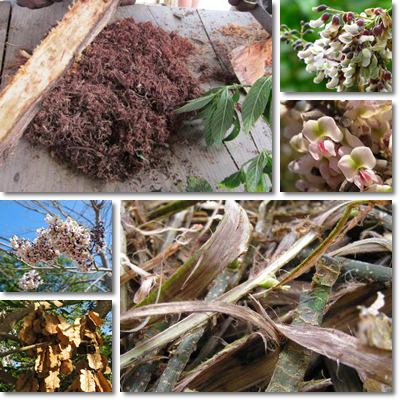Also known as Florida fishpoison or fishfuddle, Jamaican dogwood (Piscidia piscipula) is a tropical tree whose bark boasts powerful sedative, anti-inflammatory and pain-relieving properties. It is one of numerous dogwood species common across the United States and its bark has been traditionally used to treat a variety of ailments, from persistent cough to minor aches and pains, but also for mental health, to relieve stress and anxiety.
However, remember to always ask for medical advice before pursuing any form of alternative treatment in order to avoid side effects and potential medicine interactions. Also, know that Jamaican dogwood shouldn’t be confused with American dogwood (Cornus florida), the common dogwood (Cornus sanguinea) or with European cornel (Cornus mas), known simply as dogwood. Despite having similar names, which engenders great confusion, all four plants have specific medicinal properties which limit their use to certain medical conditions. Mistaking one for another can result in failure to address a certain medical problem and may even cause complications of existing health issues.

What is Jamaican dogwood and what does it look like?
Jamaican or Jamaica dogwood is a flowering tree native to the southernmost parts of the USA, Mexico, the Caribbean region and South America. It can reach heights of 10-15 meters and flowers in May, after roughly 4 years of age. The leaves are elongated and pointy, dark green on top and slightly gray-green below. It bears clusters of white flowers tinged with lemon green and red-pink which turn into 10 cm long four-winged pods.
The pods ripen in July-August, releasing oval, red-brown seeds. Jamaican dogwood bark is thin, gray-brown, with numerous tiny scales. The bark of the root is the most important part of the plant, boasting several impressive medicinal properties.
What does Jamaican dogwood taste and smell like?
Jamaican dogwood bark has a bitter, strong taste and fairly unpleasant smell. Because of the high amount of tannins giving it a pungent taste, eating it generates a burning sensation in the mouth.
What is Jamaican dogwood used for?
Traditionally, Jamaican dogwood roots, bark and leaves were used for fishing. Potent sedative chemicals in the plant, such as the toxin rotenone, helped tribe hunters tranquilize fish, making them easier to hunt. The same toxins were later found to help manage several physical and psychological medical conditions in humans, namely insomnia, anxiety, muscle spasms, inflammation and pain associated with rheumatism and arthritis, migraines, even cough and fever. The root bark is the part commonly used for medicinal purposes, but only under the careful supervision of a healthcare professional so to avoid possible side effects.

Benefits and uses of Jamaican dogwood
Find out below what are the top 5 uses of Jamaican dogwood root bark:
Strong sedative properties
Special chemicals and some toxins in Jamaican dogwood root bark boast strong sedative properties. When taken in small amounts, decoctions, tinctures and extract of the bark help treat insomnia or the common sleeplessness as well as nervous tension.
Natural anxiety reliever
The same sedative compounds in Jamaican dogwood root bark help relieve anxiety and stress, promoting both relaxation and sleep. However, if you are currently receiving anti-anxiety medication, talk to your doctor first before resorting to any herb-based remedies as plant often interact with conventional medication.
Muscle relaxant and powerful anti-inflammatory
Taking Jamaican dogwood bark preparations reduces painful stomach cramps caused by muscle spasms at the level of the gastrointestinal tract, as well as pain associated with inflammatory conditions such as arthritis and rheumatism.
Powerful pain relieving properties
Jamaican dogwood root bark boasts strong analgesic properties. As a result, it helps relieve headaches, migraines, stomach aches and muscle pain, but should only be used under the careful supervision of a medical professional.
Relieves cough and reduces fever
Apparently, Jamaican dogwood root bark can help treat cough and reduce fever due to its strong antispasmodic and anti-inflammatory action.
Available forms:
Jamaican dogwood is available in the form of decoctions, bark extracts, tincture, tea or small bark pieces. The biologically active compounds in the bark include rotenone (responsible for the sedative and pain-relieving action of the plant), isoflavones (which influence hormone metabolism), tannins (responsible for the mouth burning sensation, possible irritation and astringent activity of the plant), etc.
Other information of Jamaican Dogwood
Safety, dosage, medication interactions and side effects
When taken under the careful supervision of a healthcare professional, Jamaican dogwood root bark is fairly safe for consumption. If self-medicating, you risk over-dosing and suffering any of the following side effects: irritation, numbness, tremors, sleepiness or drowsiness, sedation, sweating, potential toxicity. Jamaican dogwood will interact with sedative medication such as zolpidem, lorazepam, phenobarbital and many others and enhance their sedative properties.
Contraindications of Jamaican Dogwood
- Do not give Jamaican dogwood to children or elderly people. These age groups are highly sensitive to the plant and may experience side effects as a result.
- Do not take Jamaican dogwood if you are pregnant or nursing. It may cause uterine contractions, miscarriage.
- Avoid using Jamaican dogwood if you are to undergo surgery (it may interact with the anesthetic) or if you are prescribed sedatives (it enhances their effects).
- Avoid self-medicating and use Jamaican dogwood only under the supervision of a healthcare professional.
- Because research is poor, there is currently no recommended dose and, as a result, dosage will be established by your doctor according to age, existing medical issues, risk factors and overall state of health.
- Seek help at once if you suspect over-dosage, medication interactions or exhibit toxicity symptoms.
While it may seem worrying to read the possible risks involved with taking Jamaican dogwood, it is fairly safe for consumption as long as you take some precautions to ensure proper dosage and avoid side effects, medication interactions or other potential health risks. A medical professional can help you find the right dosage and thus manage painful conditions such as arthritis or rheumatism, relieve muscle cramps and spasms, reduce anxiety, treat sleep problems and so on.
